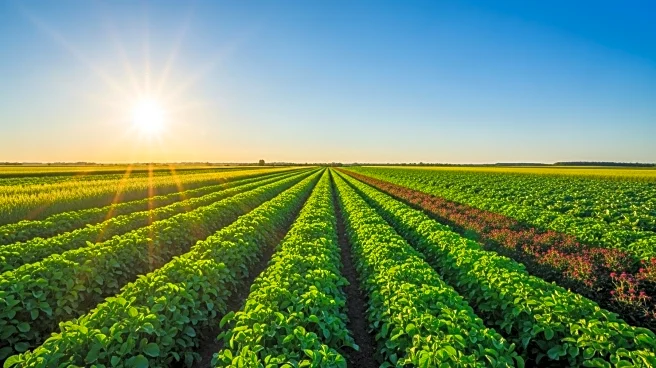What's Happening?
The United States Department of Agriculture (USDA) has announced a significant investment of $300 million through the Organic Transition Initiative. This initiative aims to support farmers transitioning to organic practices, addressing existing barriers and increasing organic acreage across the country. The USDA's move is part of a broader effort to enhance transparency and consumer trust in organic labeling, which includes the introduction of stricter Organic Livestock and Poultry Standards. These standards mandate year-round outdoor access and humane living conditions for animals. Additionally, the organic sector is witnessing significant mergers and acquisitions, such as the merger between 80 Acres Farms and Soli Organic, and the acquisition of the Fresh Vegetables Division of Dole plc by organicgirl LLC.
Why It's Important?
The USDA's investment is crucial for the growth of the organic farming sector in the United States. By supporting farmers in transitioning to organic practices, the initiative aims to increase the supply of organic products, meeting the rising consumer demand for organic foods. This move is expected to strengthen the supply chain resilience and expand product offerings in the organic sector. The mergers and acquisitions within the industry, such as those involving 80 Acres Farms and organicgirl LLC, highlight the sector's potential for growth and innovation. These developments are likely to enhance technological capabilities and operational efficiencies, benefiting both producers and consumers.
What's Next?
The organic farming sector is poised for significant growth, with the market projected to expand at a compound annual growth rate (CAGR) of 6.7% from 2025 to 2032. The USDA's initiatives and the ongoing industry consolidations are expected to drive this growth. Stakeholders, including farmers, consumers, and industry leaders, will likely monitor the impact of these developments closely. The increased focus on organic practices may also lead to further regulatory changes and innovations in farming techniques, contributing to the sector's long-term sustainability and competitiveness.
Beyond the Headlines
The USDA's investment and the industry's consolidation efforts reflect a broader trend towards sustainable and ethical farming practices. The emphasis on humane living conditions for livestock and transparency in organic labeling addresses consumer concerns about animal welfare and food safety. These developments may influence other sectors to adopt similar practices, promoting a more sustainable and ethical approach to agriculture. Additionally, the growth of the organic sector could have positive environmental impacts, such as reduced pesticide use and improved soil health.










